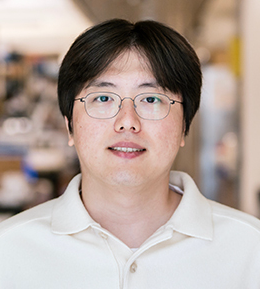
Contact
EmailMyung Jin Yang, PhD, is a NOMIS-Gladstone Fellow at the Gladstone Institute of Neurological Disease, working with Gladstone investigators Andrew Yang, PhD, and Yadong Huang, MD, PhD, as his co-mentors.
Born and raised in South Korea, Yang received his bachelor’s degree in Biological Sciences, master’s degree in Biomedical Science and Engineering, and doctorate in Biomedical Science and Engineering, all from the Korea Advanced Institute of Science and Technology (KAIST).
Under the advisership of Gou Young Koh, MD, PhD, Yang’s doctoral research focused on how tissue environments shape the diversity and functions of local vascular and lymphatic systems. He developed expertise in single-cell RNA sequencing, which was instrumental in creating the first single-cell atlas of lymphatic endothelial cells (LECs) in various tissues, including the dura, gut, and skin. This work revealed significant heterogeneity among LECs within the same tissue, identifying novel molecular markers for subtypes and uncovering tissue-specific adaptations, such as the unique gene expression in dural lymphatic capillaries for clearing neurodegenerative molecules. These findings provided new molecular insights into how lymphatic vasculatures are specialized to serve the specific functions of their surrounding tissues. In recognition of his scientific achievements and potential, Yang received the Jae Hyun Nam Biomedical Scientist Award from KAIST in 2024—an award given to only one graduating student.
As a NOMIS-Gladstone Fellow, Yang investigates the role of apolipoprotein E (APOE) variants in brain waste clearance and cognitive aging. He hypothesizes that APOE variants regulate brain waste clearance efficiency throughout the lifespan, thereby regulating brain homeostasis and proper neuronal function. His research will combine advanced proteome labeling tools with APOE manipulations and genetic models to track proteome drainage via lymphatic vessels, assess differences in clearance in various APOE genotypes, and determine the functional consequences of impairments in waste clearance on protein accumulation and neuronal function.
Yang’s research aims to reveal APOE as a novel genetic regulator of homeostatic brain waste clearance and to identify neurovascular-immune interactions that promote brain health and resilience. By bridging vascular biology, neuroscience, and aging biology, his studies may uncover mechanisms underlying neurodegenerative diseases and identify new ways to improve the clearance of brain waste.

